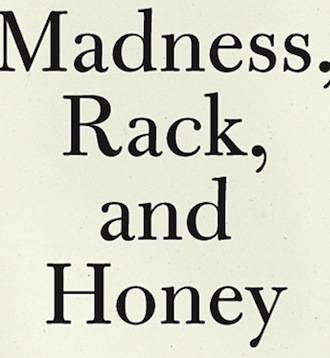This is Not a Review: A Fan’s Notes of Madness, Rack, and Honey
21.08.13
 Madness, Rack, and Honey
Madness, Rack, and Honey
Mary Ruefle
Wave Books
352 pp / $25
I was standing in a coffee shop recently holding my copy of Madness, Rack, and Honey, the collected lectures of the poet Mary Ruefle, and a barista said to me, “That book sounds pretentious.” I blushed, immediately ordering a drip coffee, which everyone knows is the least pretentious coffee drink on earth. I hadn’t yet reached the part of the book where Ruefle says, “I love pretension. It is a mark of human earthly abstraction, whereas humility is a mark of human divine abstraction. I have all eternity to be humble, while I have but a few short years to be pretentious.” After reading that I stood back up, went to the counter, and ordered the most frivolous espresso drink I could think of.
I made that last part up, but it sounds like the sort of thing Ruefle might have approved of—at least, the Ruefle of Madness, Rack, and Honey, a persona, whether she be fictitious or real, who gives great hope to those of us pretentious time wasters and poetry makers who fear we might be spending our time in vain. “I suppose, as a poet, among my fears can be counted the deep-seated uneasiness surrounding the possibility that one day it will be revealed that I consecrated myself to an imbecility,” she writes in “On Fear,” one of my favorite lectures in the book—the imbecility, of course, being poetry. She then goes on to show us, over more than 300 pages, how precisely poetry is not imbecilic. She does not tell us, mind you, since at nearly every turn she protests that she does not have very much to say about poetry after all; but she shows us through the sheer force of her literary expression and imagination.
If there is a central tension that emerges in this collection, it may be the absolute indispensability of poetry on the one hand and essential uselessness of it on the other. Never in the book does Ruefle assign poetry a practical value—there is no talk here of poets being the unacknowledged legislators of the world. (Though she does write, “In one sense, reading is a great waste of time. In another, it is a great extension of time, a way for one person to live a thousand and one lives in a single lifetime.”) Instead, she concentrates on the contradictory, the paradoxical, the oppositional, the absurd. “One views [poets] as either ‘custodians of pointless and absurd traditions’,” she writes, “or as ‘custodians of the highest form of human expression.’ It is perfectly natural to waffle between the two.”
In “On Theme,” another of my favorite lectures in the book, we follow her as she moves from a New Yorker article profiling polar fleece clothing—a material that has “no historical, cultural, or physical association with a place, a season, a society, or any living thing”—to a Shaker Village in Massachusetts whose original themes (simple living and strict spiritual discipline) have been displaced by our era’s most influential and pervasive theme (capitalist economics), to Las Vegas, “the landscape of spiritual imagination, birthplace of three of the world’s major religions,” to the faux-Victorianism of the contemporary Victorian theme, to a Disney-funded development in Florida that has been designed, top to bottom, to resemble small town America circa 1940—a trip that culminates with the conclusion that “poetry, for all periods and all cultures, has only one theme, that of mutability.”
If that assertion sounds a little definite, a little autocratic, one senses, as one often does in these lectures, that Ruefle is being very nearly as playful as she is serious. In the book’s penultimate piece, “Twenty Two Short Lectures,” she describes her idea for a literature class: “You just sit in the classroom and read aloud until everyone is smiling, and then you look around, and if someone is not smiling, you ask them why, and then you keep reading—it may take many different books—until they start smiling, too.” Which is ridiculous—and also, obviously, the best course description that has ever been devised.
In an introduction to the collection, Ruefle defines poetry as a “wandering little drift of unidentified sound”—the song a thrush makes which grows ever more elusive the further you track it into the woods. The same might be said about Ruefle’s prose lectures, whose disjunctions, departures, and associations very nearly reach the level of poetry.
In another of the “Twenty Two Short Lectures,” she instructs the listener to turn over a vase and put it on their head. Which, come to think of it, isn’t such a bad metaphor for the experience of reading the book itself. “You think the vase has become a hat,” Ruefle writes. “It has not. [Your] body has become an upside down flower.”